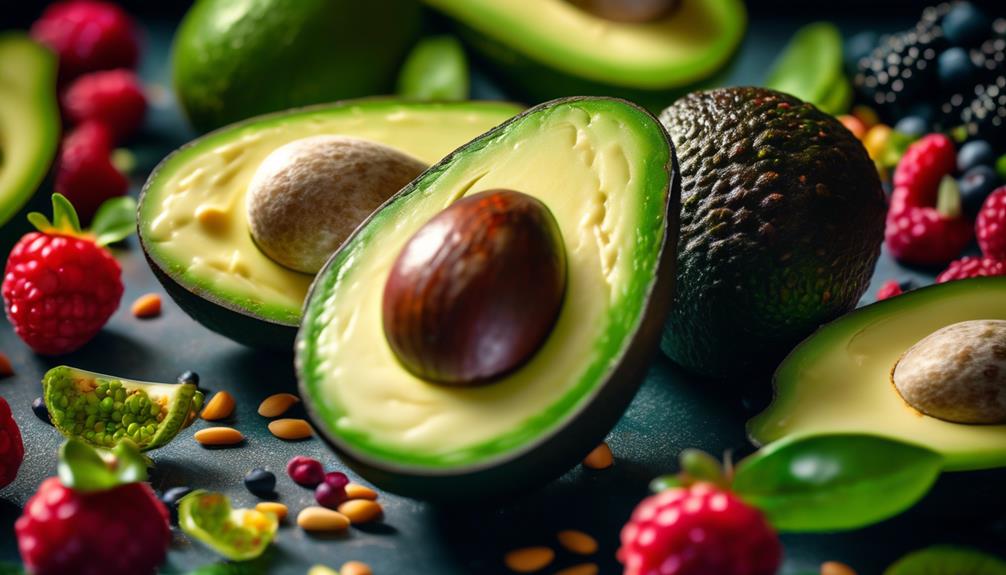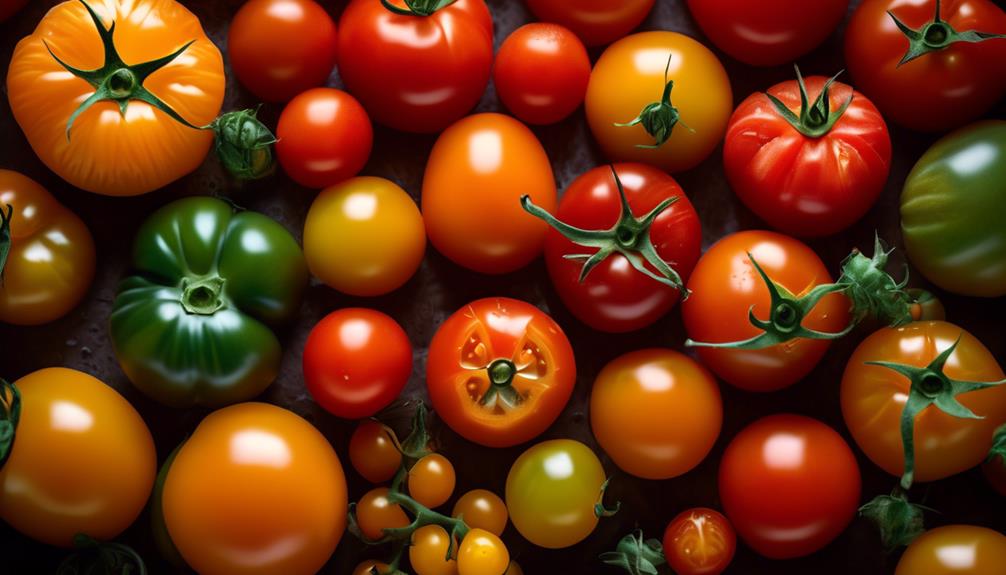Are you a vegetarian on a keto diet and struggling to find low-carb fruit options?
Well, here's an interesting statistic for you: did you know that the average apple contains around 25 grams of carbs? That's quite a lot for those following a keto lifestyle.
But fear not, because in this discussion, we will explore the 8 best low-carb fruit alternatives specifically tailored for vegetarians on the keto diet.
So, if you're looking for delicious and nutritious options that won't derail your carbohydrate intake, keep reading to discover these mouthwatering alternatives that will leave you satisfied without compromising your dietary goals.
Avocado

Avocado is a versatile fruit that's rich in healthy fats and low in carbohydrates, making it an excellent choice for those following a vegetarian keto diet. Not only is it delicious, but it also offers numerous ways to incorporate into your meals.
One popular option is avocado toast. Simply spread mashed avocado onto a slice of low-carb bread, and you have a satisfying and nutrient-dense snack. Avocado toast can be customized with additional toppings like sliced tomatoes, feta cheese, or a sprinkle of chili flakes for added flavor.
Another option is avocado smoothies. Blend a ripe avocado with almond milk, spinach, and a sweetener of your choice for a creamy and filling smoothie. Avocado adds a smooth texture and a dose of healthy fats, making it a great alternative to high-carb fruits commonly used in smoothies. Experiment with different flavor combinations by adding berries, cocoa powder, or nut butter.
Whether you enjoy avocado toast or avocado smoothies, this versatile fruit is a great addition to any vegetarian keto diet.
Berries
If you're looking to add more variety to your vegetarian keto diet, berries are a delicious and low-carb option to consider. Not only are they packed with flavor, but they also offer numerous health benefits.
Berries are rich in antioxidants, which help protect your cells from oxidative damage and reduce inflammation in the body. They're also low in carbohydrates and high in fiber, making them a great choice for those following a low-carb diet.
Incorporating berries into your vegetarian keto meal plan is easy and delicious. You can enjoy them on their own as a snack, or incorporate them into a variety of recipes. One popular option is to make a berry smoothie using unsweetened almond milk, a handful of berries, and a scoop of protein powder. Another idea is to make a mixed berry salad with spinach, walnuts, and a drizzle of olive oil.
For a sweet treat, you can try making a low-carb berry crumble using almond flour, butter, and a mixture of berries. This can be a satisfying dessert option without derailing your vegetarian keto diet.
Tomatoes

Tomatoes are a versatile and nutritious addition to a vegetarian keto diet. While they're commonly categorized as a vegetable, tomatoes are actually a fruit. Luckily, they can be enjoyed on a low-carb diet due to their relatively low carbohydrate content.
Tomatoes are rich in vitamins A and C, as well as potassium and antioxidants. They also contain lycopene, a powerful antioxidant that has been associated with various health benefits.
When following a low-carb diet, it's important to choose tomato varieties that are lower in carbohydrates. Cherry tomatoes and grape tomatoes are excellent options as they typically contain fewer carbs compared to larger varieties. These small tomatoes are also packed with flavor and can be enjoyed as a snack or added to salads and sauces.
Additionally, green tomatoes, although not as commonly consumed, are another keto-friendly option. With their tangy taste and firm texture, they can be used in a variety of recipes, such as fried green tomatoes or as a substitute for higher-carb ingredients.
Cucumbers
Cucumbers are a low-carb fruit alternative that offers numerous nutritional benefits. They're low in calories and high in water content, making them a great option for those looking to lose weight.
Cucumbers are also rich in vitamins K and C, as well as antioxidants, which promote overall health.
Additionally, cucumbers are incredibly versatile in the culinary world, whether used in salads, sandwiches, or as a refreshing snack on their own.
Nutritional Benefits
Rich in vitamins and minerals, cucumbers offer numerous nutritional benefits that can support a healthy, vegetarian keto diet. Cucumbers are low in calories and carbohydrates, making them a great choice for those following a low-carb eating plan. They're also a good source of hydration due to their high water content.
Cucumbers are rich in vitamin K, which is important for blood clotting and bone health. They also contain vitamin C, an antioxidant that supports immune function and collagen production. In addition, cucumbers provide small amounts of other essential nutrients like potassium, magnesium, and manganese.
Incorporating cucumbers into your vegetarian keto diet can help meet your recommended daily intake of vitamins and minerals. However, individuals with an allergy to cucumbers or those taking blood-thinning medications should be aware of potential health risks and consult with a healthcare professional.
Versatile Culinary Uses
Incorporating cucumbers into your vegetarian keto diet can add a refreshing and versatile element to your meals. These crunchy vegetables have a mild flavor that pairs well with a variety of ingredients, making them a fantastic addition to many culinary applications.
Here are three creative recipes to inspire you:
- Cucumber Noodle Salad: Use a spiralizer to turn cucumbers into noodles, then toss them with avocado, cherry tomatoes, and a tangy vinaigrette for a light and satisfying meal.
- Cucumber Sushi Rolls: Replace traditional sushi rice with thinly sliced cucumbers for a low-carb alternative. Fill them with your favorite veggies and protein for a nutritious and delicious sushi roll.
- Cucumber Gazpacho: Blend cucumbers with tomatoes, bell peppers, garlic, and herbs for a refreshing and chilled soup. It's perfect for hot summer days or as a light appetizer.
With these versatile culinary uses, cucumbers can elevate your vegetarian keto diet and provide endless possibilities for delicious and healthy meals.
Lemons

Are lemons a suitable low-carb fruit alternative for vegetarian keto diets?
Yes, lemons can be a great addition to a vegetarian keto diet due to their low carbohydrate content. Lemons aren't only low in carbs but also packed with vitamins and antioxidants, making them a healthy choice for those on a low-carb diet.
When it comes to lemonade recipes, you can easily make a low-carb version by using a sugar substitute like stevia or erythritol instead of regular sugar. Simply squeeze fresh lemon juice into water, add your preferred sweetener, and enjoy a refreshing and low-carb lemonade.
As for lemon desserts, you can create delicious low-carb treats using lemon zest and juice. For example, you can make a keto-friendly lemon mousse by combining whipped cream, lemon zest, lemon juice, and a sugar substitute. This creamy and tangy dessert will satisfy your sweet tooth without derailing your low-carb diet.
Zucchini
What are some ways to incorporate zucchini into a vegetarian keto diet?
Zucchini is a versatile vegetable that can be used in various recipes to add flavor, texture, and nutrients while keeping your carb intake low. Here are three ideas for incorporating zucchini into your vegetarian keto diet:
- Zucchini noodles: Replace traditional pasta with zucchini noodles, also known as zoodles. Use a spiralizer or a julienne peeler to create thin strips of zucchini that can be cooked and seasoned to mimic the texture of pasta. Pair them with a low-carb sauce or stir-fry them with vegetables and protein for a satisfying meal.
- Zucchini fritters: Make delicious fritters by grating zucchini and combining it with almond flour, eggs, and spices. Fry them in coconut oil until golden brown for a tasty low-carb snack or side dish.
- Stuffed zucchini boats: Cut zucchini in half lengthwise and scoop out the flesh to create hollow 'boats.' Fill them with a mixture of vegetables, cheese, and herbs, then bake until tender. This versatile dish can be customized to suit your taste preferences and makes for a satisfying and nutritious meal.
Not only is zucchini low in carbs, but it also offers several health benefits. It's rich in vitamins A and C, which help support a healthy immune system. Additionally, zucchini is a good source of fiber, which aids digestion and promotes feelings of fullness. Incorporating zucchini into your vegetarian keto diet can be a delicious and nutritious way to add variety to your meals.
Olives

Olives offer numerous nutritional benefits, making them a great addition to a vegetarian keto diet. They're rich in healthy fats and contain vitamins, minerals, and antioxidants.
Additionally, olives are incredibly versatile and can be used in various culinary dishes, such as salads, pizzas, and tapenades.
It's important to keep in mind the recommended serving sizes to ensure you're staying within your daily carb limits while enjoying the benefits of olives.
Nutritional Benefits
With their rich nutrient profile and unique flavor, olives offer a range of nutritional benefits that make them a valuable addition to a vegetarian keto diet. Here are three reasons why you should consider incorporating olives into your low-carb fruit alternatives:
- High in healthy fats: Olives are a great source of monounsaturated fats, which have been linked to improved heart health and reduced inflammation. These fats are also essential for maintaining a healthy weight and promoting satiety.
- Rich in antioxidants: Olives contain powerful antioxidants, such as vitamin E and polyphenols, which help protect your cells from damage caused by free radicals. These antioxidants play a crucial role in reducing the risk of chronic diseases, including cancer and heart disease.
- Low in carbs: Olives are low in carbs, making them an excellent choice for a vegetarian keto diet. With only a few grams of carbs per serving, olives can be enjoyed as a tasty and satisfying snack without compromising your ketosis.
Versatile Culinary Uses
One delicious way to incorporate olives into your vegetarian keto diet is by exploring their versatile culinary uses. Olives aren't only packed with healthy fats and low in carbs, but they also offer a unique flavor that can enhance various dishes.
Their culinary creativity knows no bounds, and they can be used in a multitude of ways. You can chop them up and sprinkle them over salads or use them as a topping for pizzas and flatbreads. Olives also pair well with cheese, making them a great addition to charcuterie boards or cheese platters.
Additionally, you can incorporate olives into pasta sauces, stir-fries, and even homemade dips. Don't be afraid to experiment with different flavor combinations to discover your favorite way to enjoy olives on your vegetarian keto diet.
Recommended Serving Sizes
To ensure proper portion control on your vegetarian keto diet, it's important to consider the recommended serving sizes for olives. Olives are a popular choice for those following a low-carb lifestyle due to their high fat content and low carb content.
Here are three recommended serving sizes to help you maintain portion control and stay within your carb limit:
- Green Olives: A serving size of green olives is typically around 5-6 olives. This portion contains approximately 1 gram of carbs.
- Black Olives: For black olives, a serving size is generally around 8-10 olives. This portion contains approximately 2 grams of carbs.
- Stuffed Olives: Stuffed olives, such as those filled with garlic or cheese, should be enjoyed in moderation due to their higher calorie and carb content. Aim for 2-3 olives per serving, which typically contains around 1-2 grams of carbs.
Coconuts

Coconuts, known for their versatility and rich flavor, are a popular choice among those following a low-carb vegetarian keto diet. While coconuts are often associated with their high-fat content, they can still be enjoyed in moderation due to their numerous health benefits.
Coconut water, the clear liquid found inside the coconut, is a refreshing and low-carb alternative to sugary beverages. It's naturally low in carbohydrates and provides essential electrolytes, making it a great option for staying hydrated on a keto diet.
Additionally, coconut oil, extracted from the flesh of mature coconuts, is a staple in many keto recipes. It's high in healthy fats called medium-chain triglycerides (MCTs), which are easily digested and can be utilized for energy. Coconut oil has also been shown to increase feelings of fullness and boost metabolism. However, it's important to consume coconut oil in moderation, as it's calorie-dense.
Conclusion
In conclusion, these low-carb fruit alternatives are perfect for those following a vegetarian keto diet. Avocado, berries, tomatoes, cucumbers, lemons, zucchini, olives, and coconuts offer a variety of flavors and textures that can satisfy your fruit cravings without derailing your low-carb goals.
Incorporating these options into your meals won't only provide essential nutrients but also add color and vibrancy to your plate. Enjoy the deliciousness while staying true to your vegetarian keto lifestyle.







